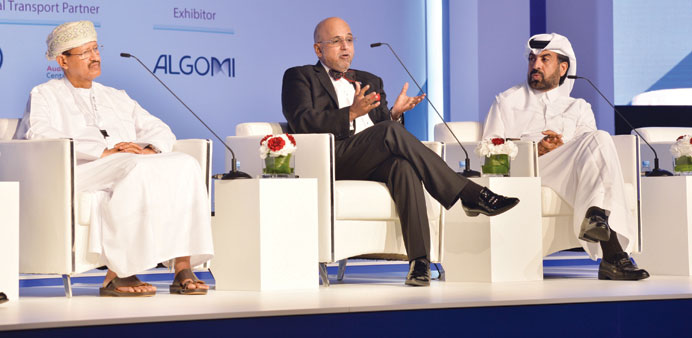Seetharaman stresses a point during the panel discussion.
Market reforms in the Gulf Co-operation Council (GCC) should enhance liquidity and investments from global investors, Doha Bank Group CEO Dr R Seetharaman has said.
He was speaking yesterday at a panel discussion during the 55th World Federation of Exchanges (WFE) General Assembly and Annual Meeting hosted by the Qatar Stock Exchange (QSE).
Seetharaman said market reforms in the GCC “should shape up,” taking into consideration both the global and regional liquidity as GCC markets expect to receive inflows from both regional and global investors. He pointed out that tightening of liquidity will impact inflows into the region.
He suggested that enhancement of liquidity in the GCC can be done by upgrading the GCC markets with MSCI, developing wider instruments for regional and global investors, encouraging short selling, segmenting the capital market separately for SME sector, and enhancing corporate governance to provide “appropriate information” for global and local investors.
Also, he stressed that corporates should invest in investor relationships to have periodic communication with investors.
On reforms undertaken in GCC capital markets, Seetharaman said the policy objectives in developing GCC capital markets will enable corporates to raise capital and provide a savings and investment forum for the domestic population.
He said the opening of the Saudi market through the Qualified Foreign Institutional Investor programme will see some additional inflows from foreign investors, but the significant event to watch would be the MSCI upgrade of the market to the Emerging Market Index.
On reforms undertaken by the QSE in recent years, Seetharaman said the QSE was connected to Secure Financial Transaction Infrastructure (SFTI), a worldwide network that connects banks and brokers across the world to exchanges in Europe and the US. “Qatar Stock Exchange introduced a number of new equity indices to supplement the existing QSE Index. It had initiated Treasury bill trading and trading of government bonds, and was upgraded to ‘emerging market status’ in 2014.
“It is also working on SME exchange and exchange traded fund initiatives. The QSE Venture Market will be dedicated to SMEs, and will be founded on strong domestic roots,” he said.
On global economic growth, Seetharaman said the International Monetary Fund (IMF) revised it down to 3.1% and 3.6% for 2015 and 2016, respectively.
He said advanced economies are expected to grow by 2% and 2.2% in 2015 and 2016, respectively, while emerging economies are expected to grow by 4% in 2015 and 4.5% in 2016.
The decline in growth this year reflects a further slowdown in emerging markets, partially offset by a modest pickup in activity in advanced economies, particularly in the euro area, he said.

